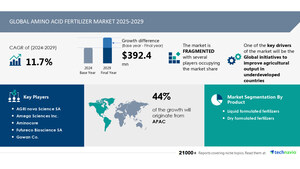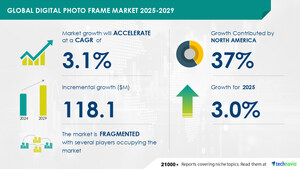NEW YORK, July 10, 2024 /PRNewswire/ -- The global blockchain technology in transportation and logistics industry is poised for substantial growth, with an estimated increase of USD 6.91 billion from 2024 to 2028, at a CAGR of approximately 60.82%. This growth is driven by the increasing adoption of blockchain in trucking, facilitated by the advent of Blockchain-as-a-Service (BaaS). Despite its benefits, challenges such as high implementation costs remain. Key players like Accenture, Amazon, IBM, and Microsoft are leading the way. Real-world applications include transparent supply chain management (Walmart), secure freight tracking (Maersk), and efficient customs processing (IBM and Maersk's TradeLens platform).
Get a detailed analysis on regions, market segments, customer landscape, and companies - Click for the snapshot of this report
Forecast period |
2024-2028 |
Base Year |
2023 |
Historic Data |
2018 - 2022 |
Segment Covered |
Mode Of Transportation (Land, Sea, and Others), End-user (SMEs and Large enterprises), and Geography (North America, Europe, APAC, South America, and Middle East and Africa) |
Region Covered |
North America, Europe, APAC, South America, and Middle East and Africa |
Key companies profiled |
Accenture Plc, Amazon.com Inc., Amcon Soft, Ara Soft Group LLC, Capgemini Service SAS, Cargoledger, Deloitte Touche Tohmatsu Ltd., HCL Technologies Ltd., Infosys Ltd., International Business Machines Corp., Koopman Logistics Group BV, Microsoft Corp., modum.io AG, OpenLedger, Oracle Corp., PixelPlex Ltd, SAP SE, Slync Inc., Sweetbridge Ltd., Tencent Holdings Ltd., and Wipro Ltd. |
Key Market Trends Fueling Growth
Businesses in the transportation and logistics industry are increasingly turning to Block-as-a-Service (BaaS) providers to implement blockchain technology. IBM, Oracle, Microsoft, and Amazon are among the vendors offering BaaS, recognizing the growing demand. Enterprises benefit from reduced fraud, increased transparency, and secure record keeping. BaaS is also gaining traction in insurance, cybersecurity, and supply chain management. For enterprises lacking technical expertise, BaaS providers offer an easier solution. This trend is expected to boost the adoption of BaaS in the transportation and logistics industry, contributing to market growth during the forecast period.
Blockchain technology is revolutionizing the transportation and logistics industry with its distributed ledger system. Companies like Lean Lane and Horizon Kinetics are leading the charge, exploring the use of this technology in verticals like manufacturing supply and public services. Regulatory acceptance is on the horizon, with regulators and policymakers at both the national and international levels showing interest. ICOs and venture capitalists are fueling capital inflows, driving innovation in this space. Blockchain IoT is a game-changer, enabling real-time tracking and data registries for record management and contract information. Smart contracts and digital identity offer new levels of security and control. However, challenges remain, including regulatory status, standardization, interoperability, and technical skillset. Key trends include asset markets, efficiency, and customer experience. Banking and payments are also being disrupted with the use of blockchain technology, including exchanges, smart contracts, and DeFi. Patents and webinar materials are available for those looking to learn more. The future of blockchain in transportation and logistics is bright, offering a diamond standard for document management and regulatory compliance.
Discover 360° analysis of this market. For complete information, schedule your consultation- Book Here!
Market Challenges
- The transportation and logistics industry is exploring the use of blockchain technology to enhance productivity, security, and efficiency. However, the implementation of this technology comes with significant upfront costs. Enterprises must invest in developing or purchasing custom software and setting up servers and nodes to store the growing amount of data on the blockchain. The recurring payment model is not feasible due to the blockchain's design to store data indefinitely. As the number of transactions increases, so does the amount of data and the number of nodes required. Careful consideration of the high implementation costs is necessary for enterprises in the transportation and logistics industry before adopting blockchain technology.
- Blockchain technology is revolutionizing the transportation and logistics industry by providing a secure, transparent, and efficient way to manage complex supply chains and asset markets. However, challenges remain, such as regulatory acceptance at both national and international levels, standardization, interoperability, and control challenges. Companies like Lean Lane and LeewayHertz are leading the way, but regulatory status and technological complexities present hurdles. ICOs and venture capitalists are investing in blockchain startups, driving capital inflows and innovation. Distributed ledger technology, smart contracts, and digital identity are key components, along with IoT integration and record management. Policymakers and regulators must work together to establish clear guidelines and technical skillsets. The potential for increased efficiency, improved customer experience, and new business models in banking, manufacturing supply, and public services is vast. However, security and patents remain concerns. Join US for a webinar or conference to learn more about the future of blockchain in transportation and logistics. Diamond Standard and DeFi are also areas of interest for industry verticals.
For more insights on driver and challenges - Download a Sample Report
Segment Overview
This blockchain technology in transportation and logistics industry market report extensively covers market segmentation by
- Mode Of Transportation
- 1.1 Land
- 1.2 Sea
- 1.3 Others
- End-user
- 2.1 SMEs
- 2.2 Large enterprises
- Geography
- 3.1 North America
- 3.2 Europe
- 3.3 APAC
- 3.4 South America
- 3.5 Middle East and Africa
1.1 Land-
For more information on market segmentation with geographical analysis including forecast (2024-2028) and historic data (2018 - 2022) - Download a Sample Report
Research Analysis
Blockchain technology is revolutionizing the transportation and logistics industry by providing a secure and transparent way to manage complex supply chains, payments, and documentation. This decentralized technology enables smart contracts, ensuring efficiency and reducing the need for intermediaries. With the ability to create digital identities and secure data registries, it offers enhanced security and control challenges are minimized. In the logistics sector, blockchain technology can streamline record management, from proof of delivery to contract information. In the manufacturing supply chain, it can ensure the authenticity of goods and improve traceability. In the payments sphere, it offers faster and cheaper transactions through cryptocurrency exchanges. Conferences and industry events provide a platform for experts to discuss the latest developments and technical skillset required to implement blockchain technology. Patents are being filed to protect intellectual property, and public services are exploring its potential to improve customer experience and security. Overall, blockchain technology offers a promising future for the transportation and logistics industry.
Market Research Overview
Blockchain technology is revolutionizing the transportation and logistics industry by providing a secure, decentralized, and transparent solution for various supply chain processes. The use of blockchain technology in this sector offers numerous benefits, including efficient payments through cryptocurrencies and smart contracts, secure documentation, and digital identity management. The banking sector is also exploring the use of blockchain technology for faster and cheaper cross-border payments. At the technical level, blockchain technology enables interoperability and standardization through the use of distributed ledgers and digital asset markets. Regulatory acceptance at both national and international levels is a crucial factor for the widespread adoption of blockchain technology in the transportation and logistics industry. Key verticals, such as manufacturing supply and record management, are leveraging blockchain technology to improve efficiency, security, and control. The use of blockchain IoT is also gaining popularity for real-time tracking and monitoring of goods in transit. Venture capitalists and policymakers are investing in and promoting the use of blockchain technology in the transportation and logistics industry. The industry is also witnessing a surge in capital inflows through Initial Coin Offerings (ICOs) and the growth of decentralized finance (DeFi) platforms. The regulatory status of blockchain technology in the transportation and logistics industry is a challenge that needs to be addressed. Policymakers and regulators are working to establish clear guidelines and standards for the use of blockchain technology in this sector. The use of blockchain technology in the transportation and logistics industry offers a wealth of opportunities for innovation and disruption. Companies are exploring the use of smart contracts for automating complex processes, creating new business models, and improving customer experience. In conclusion, the transportation and logistics industry is on the brink of a blockchain revolution. The use of blockchain technology offers numerous benefits, including efficiency, security, and transparency. However, regulatory acceptance and standardization are crucial factors for the widespread adoption of this technology. The future of the transportation and logistics industry is exciting, and blockchain technology is at the forefront of this transformation. Here are some webinar materials and resources for further reading on blockchain technology in the transportation and logistics industry: 1. "Blockchain in Transportation and Logistics: Use Cases, Challenges, and Opportunities" by Gartner 2. "Blockchain in Logistics: Use Cases and Benefits" by DHL 3. "Blockchain in Transportation and Logistics: A Comprehensive Review" by Springer 4. "Blockchain in Logistics: Current State and Future Prospects" by ResearchGate 5. "Blockchain in Transportation and Logistics: A Review" by IEEE Access.
Table of Contents:
1 Executive Summary
2 Market Landscape
3 Market Sizing
4 Historic Market Size
5 Five Forces Analysis
6 Market Segmentation
- Mode Of Transportation
- Land
- Sea
- Others
- End-user
- SMEs
- Large Enterprises
- Geography
- North America
- Europe
- APAC
- South America
- Middle East And Africa
7 Customer Landscape
8 Geographic Landscape
9 Drivers, Challenges, and Trends
10 Company Landscape
11 Company Analysis
12 Appendix
About Technavio
Technavio is a leading global technology research and advisory company. Their research and analysis focuses on emerging market trends and provides actionable insights to help businesses identify market opportunities and develop effective strategies to optimize their market positions.
With over 500 specialized analysts, Technavio's report library consists of more than 17,000 reports and counting, covering 800 technologies, spanning across 50 countries. Their client base consists of enterprises of all sizes, including more than 100 Fortune 500 companies. This growing client base relies on Technavio's comprehensive coverage, extensive research, and actionable market insights to identify opportunities in existing and potential markets and assess their competitive positions within changing market scenarios.
Contacts
Technavio Research
Jesse Maida
Media & Marketing Executive
US: +1 844 364 1100
UK: +44 203 893 3200
Email: [email protected]
Website: www.technavio.com/
SOURCE Technavio

WANT YOUR COMPANY'S NEWS FEATURED ON PRNEWSWIRE.COM?
Newsrooms &
Influencers
Digital Media
Outlets
Journalists
Opted In





Share this article